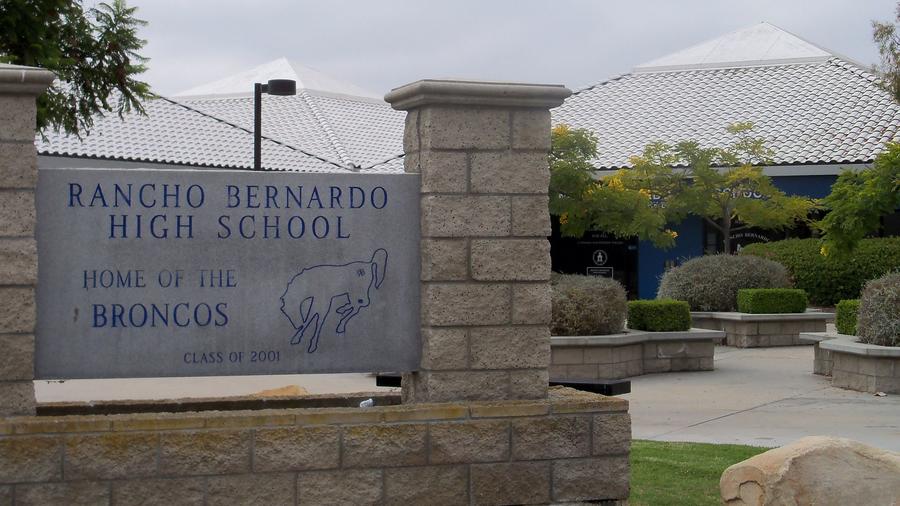Rancho Bernardo High School Trainer Leads Team In Life-Saving Effort

Rancho Bernardo High School. (Elizabeth Marie Himchak)
Two hours before last Friday’s basketball games, Rancho Bernardo High’s head athletic trainer, Robbie Bowers, reviewed with his team its emergency protocols.
They do the review frequently so — on the rare occasion their skills might be needed — they are ready to act, he said.
The fourth quarter of the boys game against Westview became that rare occasion.
“I heard a commotion going on and my wife sitting nearby yelled something to me,” he said. “I started to rip my jacket off and went up (the bleachers).”
There he found a Westview staff member’s grandparent — Rancho Bernardo resident Bill Parkhurst — in medical distress, which Bowers said he identified as cardiac arrest.
“I immediately started chest compressions, my intern from SDSU brought the defibrillator and my athletic trainer prepped his chest,” Bowers said on Monday when asked to recall the incident. Among others who stepped in to help was Westview’s athletic trainer, Christina Scherr.
Parkhurst had been sitting on the bleachers’ top tier with the wall behind him, so that was the perfect spot to perform the lifesaving actions, Bowers said, adding it would have been difficult to move him.
An automatic external defibrillator — AED for short — indicates if the person needs to be shocked to get the heart going. It indicated a shock was needed and after the AED applied electricity to the man’s body Bowers said he began chest compressions again. After 30 seconds, Parkhurst started to show signs of life, making sounds and, when asked, was able to correctly say his first name.
As all this was going on, another staff member called 911 and additional staffers went to the two campus entrances to meet paramedics and direct them to the correct venue, Bowers said.
Bowers, who is certified in medical procedures through the National Athletic Trainers Association, said there is a difference between sudden cardiac arrest and heart attack. He said the latter is triggered by a blockage in the heart’s arteries and in many cases the person does not lose consciousness. In sudden cardiac arrest the heart stops, the person loses consciousness and if the heart is not returned to a normal rhythm the person could die within minutes.
In his three decades in the field (27 years at RB High), Bowers said this is the second time he has been called into action like this. The first was about 10 years ago while at a game in Riverside. In that case the man had an extensive history of heart attacks and cardiac disease, and an AED was not available. “The ref died doing what he loved,” Bowers said.
This time, the result was dramatically different. Bowers said he heard through a third-party that the man is hospitalized but doing well, and that night his family told Bowers that his swift efforts “appear to have saved his life.”
On Tuesday afternoon, Barbara Jean Parkhurst said her husband was undergoing surgery. She said she had not wanted her husband of more than six decades to attend the game, but is now glad he did because if he had collapsed at home the outcome might have been different. She credits Bowers and the others with saving his life.
While trained in how to use an AED, Bowers said this was his first time to deliver a shock. He said it is so simple even someone without training could do it.
“It turned out (using an AED) was exactly like we trained,” Bowers said. “It’s that easy. You do not have to be specially trained.”
He said RB High has three AEDs — one in the nurse’s office, another at the pool’s lifeguard tower and a third in the gym, near his office, which due to protocol he takes to games, keeping it nearby just in case.
“(Robbie) and his team’s response was perfect,” said RB High Principal Dave LeMaster. “They basically saved a life. ... I was impressed to see them in action.”
Bowers said because of their frequent protocol reviews everyone knew what role they had so the rescue was “seamless.” However, Bowers said he couldn’t sleep that night and he reviewed the situation repeatedly to see what they could do better in the future. The team has also discussed its efforts.
“We could improve on crowd control, because it was a little bit of an issue hearing the prompts,” Bowers said, adding he was so focused on what he was doing that he did not realize the game was stopped. “But we did have a lot of support in maintaining modesty of the patient.” He added, “Every experience is a learning opportunity. I’m very proud of (my team’s) response.”
Story Credit: http://www.sandiegouniontribune.com/pomerado-news/news/schools/sd-cm-pow-news-lifesaving-rbhs-trainer-20170125-htmlstory.html


